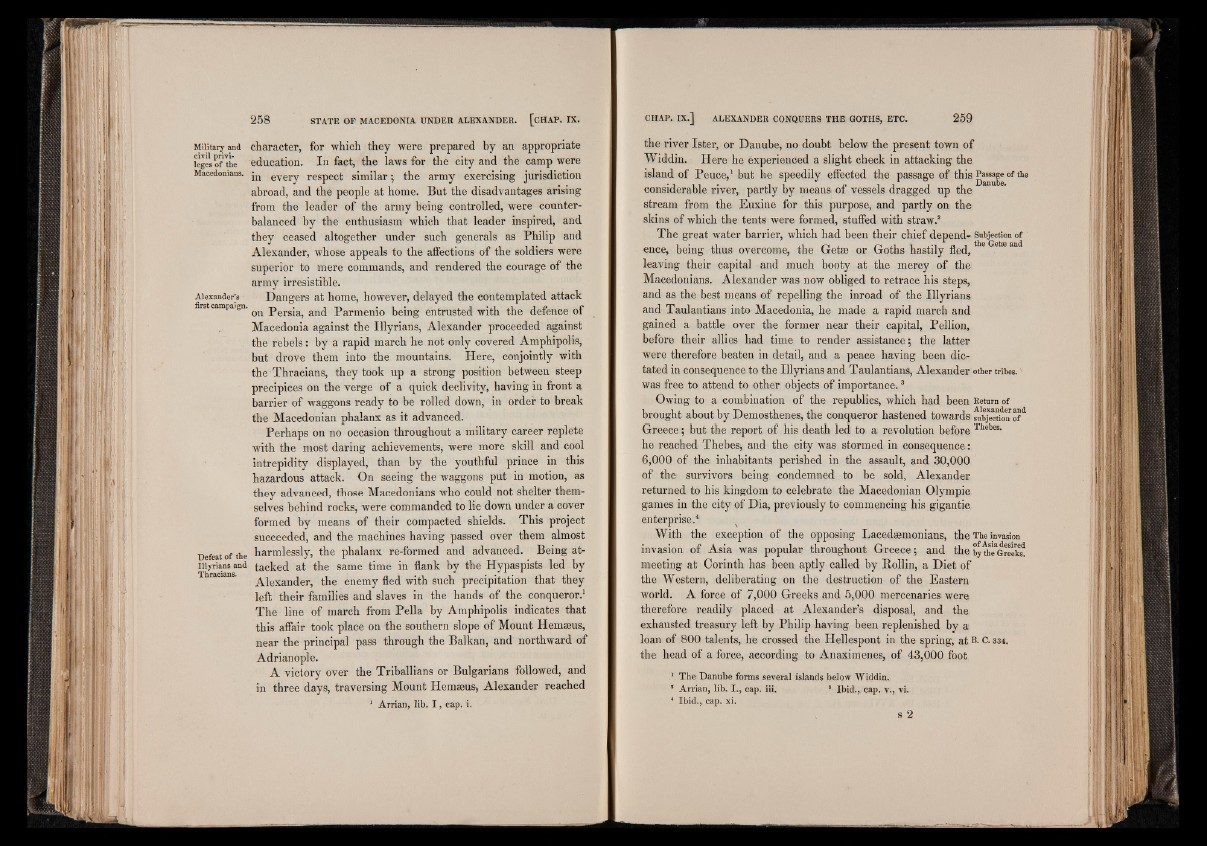
Military and
civil privileges
of the
Macedonians.
Alexander’s
first campaign.
Defeat of the
Illyrians and
Thracians.
character, for which they were prepared by an appropriate
education. In fact, the laws for die city and the camp were
in every respect similar; the army exercising jurisdiction
abroad, and the people at home. But the disadvantages arising
from the leader of the army being controlled, were counterbalanced
by the enthusiasm which that leader inspired, and
they ceased altogether under such generals as Philip and
Alexander, whose appeals to the affections of the soldiers were
superior to mere commands, and rendered the courage of the
army irresistible.
Dangers at home, however, delayed the contemplated attack
on Persia, and Parmenio being entrusted with the defence of
Macedonia against the Illyrians, Alexander proceeded against
the rebels: by a rapid march he not only covered Amphipolis,
hut drove them into the mountains. Here, conjointly with
the Thracians, they took up a strong position between steep
precipices on the verge of a quick declivity, having in front a
barrier of waggons ready to be rolled down, in order to break
the Macedonian phalanx as it advanced.
Perhaps on no occasion throughout a military career replete
with the most daring achievements, were more skill and cool
intrepidity displayed, than by the youthful prince in this
hazardous attack. On seeing the waggons put in motion, as
they advanced, those Macedonians who could not shelter themselves
behind rocks, were commanded to lie down under a cover
formed by means of their compacted shields. This project
succeeded, and the machines having passed over them almost
harmlessly, the phalanx re-formed and advanced. Being attacked
at the same time in flank by the Hypaspists led by
Alexander, the enemy fled with such precipitation that they
left their families and slaves in the hands of the conqueror.1
The line of march from Pella by Amphipolis indicates that
this affair took place on the southern slope of Mount Hemseus,
near the principal pass through the Balkan, and northward of
Adrianople.
A victory over the Triballians or Bulgarians followed, and
in three days, traversing Mount Hemseus, Alexander reached
1 Arrian, lib. I , cap. i.
the river Ister, or Danube, no doubt below the present town of
Widdin. Here he experienced a slight cheek in attacking the
island of Peuce,1 but he speedily effected the passage of this Passage of the
considerable river, partly by means of vessels dragged up the
stream from the Euxine for this purpose, and partly on the
skins of which the tents were formed, stuffed with straw.2
The great water barrier, which had been their chief depend- Subjection of
ence, being thus overcome, the Getse or Goths hastily fled,
leaving their capital and much booty at the mercy of the
Macedonians. Alexander was now obliged to retrace his steps,
and as the best means of repelling the inroad of the Illyrians
and Taulantians into Macedonia, he made a rapid march and
gained a battle over the former near their capital, Pellion,
before their allies had time to render assistance; the latter
were therefore beaten in detail, and a peaee having been dictated
in consequence to the Illyrians and Taulantians, Alexander other tribes, i
was free to attend to other objects of importance.3
Owing to a combination of the republics, which had been Return of
brought about by Demosthenes, the conqueror hastened towards snbfectkmofd
Greece; but the report of his death led to a revolution before Thebes-
he reached Thebes, and the city was stormed in consequence:
6,000 of the inhabitants perished in the assault, and 30,000
of the survivors being condemned to be sold, Alexander
returned to his kingdom to celebrate the Macedonian Olympic
games in the city of Dia, previously to commencing his gigantic
enterprise.4
With the exception of the opposing Lacedaemonians, the The invasion
invasion of Asia was popular throughout Greece; and thebytheSGreeS
meeting at Gorinth has been aptly called by Rollin, a Diet of
the Western, deliberating on the destruction of the Eastern
world. A force of 7,000 Greeks and 5,000 mercenaries were
therefore readily placed at Alexander’s disposal, and the
exhausted treasury left by Philip having been replenished by a
loan of 800 talents, he crossed the Hellespont in the spring, at b. c. 334.
the head of a force, according to Anaximenes, of 43,000 foot
The Danube forms several islands below Widdin.
8 Arrian, lib. I., cap, iii. 8 Ibid., cap. v., vi,
4 Ibid., cap. xi.
s 2